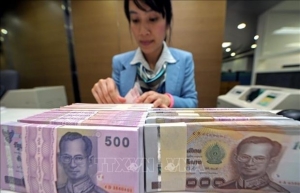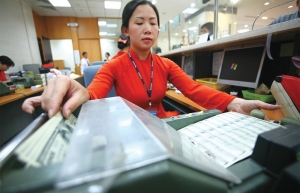Central bank keeps close eye on forex market movements
On September 27, the State Bank of Vietnam (SBV) withdrew VND20 trillion ($844 million) from the system, though continued to offer 28-day treasury bills, meaning that this amount will be pumped back in on October 25.
This is the fifth consecutive session of 28-day bill issuance, with a total approximating VND70 trillion ($2.95 billion) offered for sale through interest rate auctions.
 |
In fact, during the period from February to March this year, the SBV continuously withdrew money through bill issuances.
In February alone, net withdrawals over two weeks touched $5.9 billion, and the SBV injected money again at the end of the period.
Last year, the SBV also withdrew $2.95 billion in one week. Therefore, the recent bill issuance did not cause much surprise for market observers.
Tran Thi Khanh Hien, head of research at MB Securities, stated that the central bank is carefully striving to maintain the natural evolution of exchange rates as other regional currencies have weakened significantly against the US dollar.
| SBV’s recent bill issuance move can be seen as a way to adjust short-term liquidity in the system, which is a common occurrence for central banks. |
SBV’s recent bill issuance is aiming to keep the VND at a competitive level to stimulate exports. The move comes as the Chinese renminbi has decreased by 6 per cent, the Thai baht by 5.3 per cent, and the Malaysian ringgit by 6.5 per cent.
“SBV’s continuous net withdrawal is just a temporary solution to push up interbank interest rates and limit trading activities to avail of interest rate differences. However, interbank interest rates have not increased significantly after recent sessions, so I think the withdrawals may continue for the next few days,” said Hien.
Echoing this mindset, a senior leader at Maybank said that the low interest rate showcases the current banking system’s ample liquidity.
“The SBV is carefully calculating the amount of money to withdraw through T-bills, ensuring that the dosage is sufficient to achieve the goal of increasing interest rates in the interbank market. This will soften pressure on the exchange rate without causing liquidity disruptions for the entire economy, ensuring lending interest rates continue their downward trend,” said the expert.
Analysts at a major Hanoi-based securities firm maintained that SBV’s recent bill issuance move can be seen as a way to adjust short-term liquidity in the system, which is a common occurrence for central banks. This does not mean the SBV has reversed its monetary policy stance.
As Vietnam’s GDP growth has not made a breakthrough in the current period, and inflation is still well below the government's target, experts do not anticipate the SBV reversing its monetary policy stance, leaning more towards the scenario where it cautiously maintains the current monetary policy easing.
In respect to forex market movements, Nguyen Ba Hung, chief economist at the Asian Development Bank, said that it is important to look at both the policy and market angles when it comes to the exchange rate story.
Hung believes that in terms of policy, the SBV has been acting flexibly by expanding its margins. The market fluctuations have been kept under control, meaning there are no major problems.
“The recent fluctuations in the forex market are related to the SBV’s recent bill issuance, and they will stabilise afterwards. The exchange rate policy is not a big problem at this time, especially as foreign currency reserves have been increasing,” Hung said.
 | Thai central bank raises interest rate to 9-year high The Bank of Thailand (BoT) raised its key interest rate to a nine-year high on August 2, amid concerns about possible inflation and political instability. |
 | Central bank joins regional payment connectivity expansion The State Bank of Vietnam (SBV), has officially joined the Regional Payment Connectivity (RPC) initiative. |
 | State-owned banks leading in forex trading revenues The profits from foreign exchange trading at major banks are still consistently substantial, even in the face of significant exchange rate fluctuations. |
What the stars mean:
★ Poor ★ ★ Promising ★★★ Good ★★★★ Very good ★★★★★ Exceptional
Related Contents
Latest News
More News
- Banking sector targets double-digit growth (February 23, 2026 | 09:00)
- Private capital funds as cornerstone of IFC plans (February 20, 2026 | 14:38)
- Priorities for building credibility and momentum within Vietnamese IFCs (February 20, 2026 | 14:29)
- How Hong Kong can bridge critical financial centre gaps (February 20, 2026 | 14:22)
- All global experiences useful for Vietnam’s international financial hub (February 20, 2026 | 14:16)
- Raised ties reaffirm strategic trust (February 20, 2026 | 14:06)
- Sustained growth can translate into income gains (February 19, 2026 | 18:55)
- The vision to maintain a stable monetary policy (February 19, 2026 | 08:50)
- Banking sector faces data governance hurdles in AI transition (February 19, 2026 | 08:00)
- AI leading to shift in banking roles (February 18, 2026 | 19:54)

 Tag:
Tag:


























 Mobile Version
Mobile Version